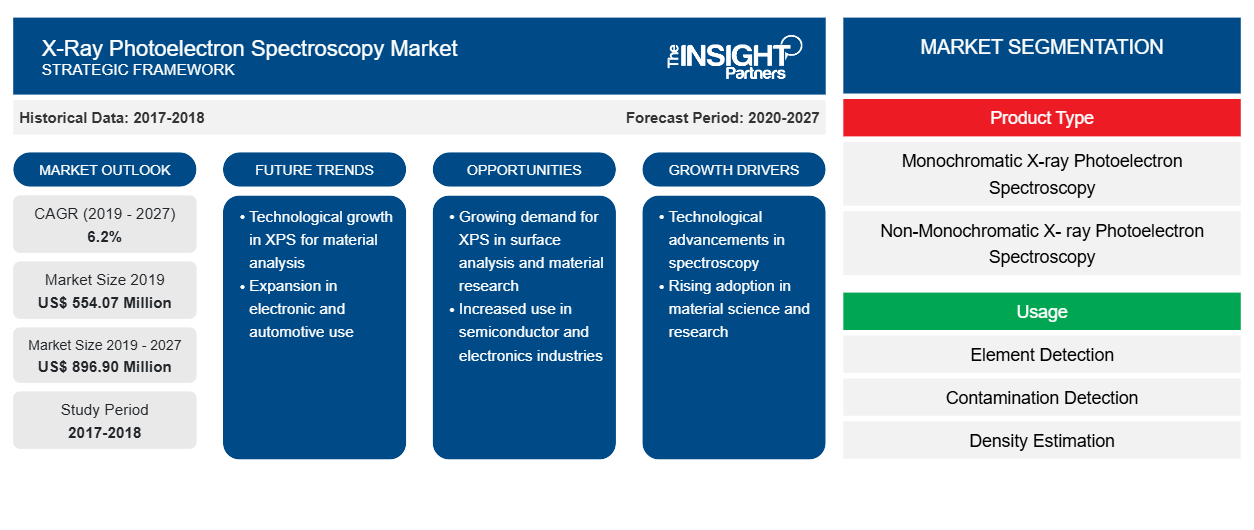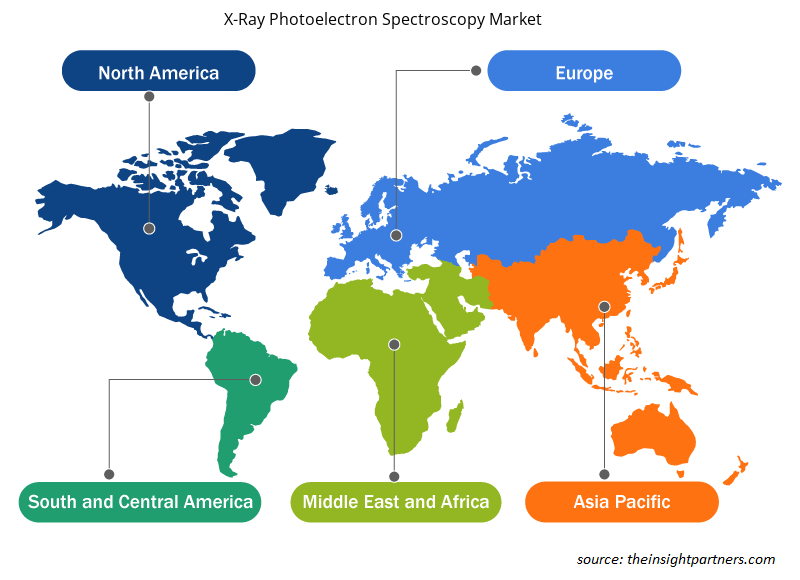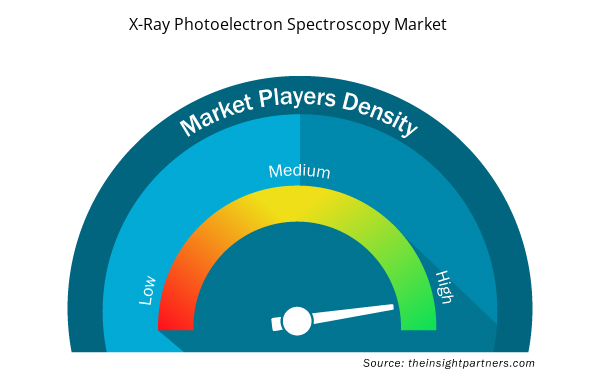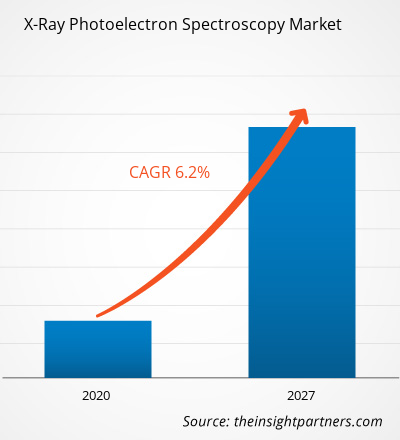The X-ray photoelectron spectroscopy market was valued at US$ 554.07 million in 2019 and is expected to grow at a CAGR of 6.2% from 2020 to 2027 to reach US$ 896.90 million by 2027.
X-ray photoelectron spectroscopy (XPS) is a quantitative spectroscopic technique that is used to measure the elemental composition, empirical formula, chemical state, and electronic state of the elements that exist within a given sample. The global X-ray photoelectron spectroscopy market is driven by factors such as increasing demand for high-performance materials and increasing funding by private bodies in R&D, but the shortage of skilled professionals is anticipated to restrain the market growth during the forecast period. However, development opportunities in emerging countries are likely to deliver substantial growth opportunities to improve market share for industry players in the near future.
Market Insights
Increasing Demand for High-Performance Materials
X-ray photoelectron spectroscopy (XPS) is a technique, which is used to analyze the surface chemistry of a material. The XPS technique is also known as electron spectroscopy for chemical analysis (ESCA), which is a well-established method for the chemical characterization of material surfaces. The suppliers and manufacturers of both technical and commercial textiles are focusing on developing XPS as an ideal tool to support the optimization and development of the types of surface coating or treatment demanded by the consumers. Polymer meshes, such as polyester and polypropylene, are used for the surgical repair of hernias and other soft tissue defects.
Customize This Report To Suit Your Requirement
You will get customization on any report - free of charge - including parts of this report, or country-level analysis, Excel Data pack, as well as avail great offers and discounts for start-ups & universities
X-Ray Photoelectron Spectroscopy Market: Strategic Insights

- Get Top Key Market Trends of this report.This FREE sample will include data analysis, ranging from market trends to estimates and forecasts.
You will get customization on any report - free of charge - including parts of this report, or country-level analysis, Excel Data pack, as well as avail great offers and discounts for start-ups & universities
X-Ray Photoelectron Spectroscopy Market: Strategic Insights

- Get Top Key Market Trends of this report.This FREE sample will include data analysis, ranging from market trends to estimates and forecasts.
Although there is the use of mesh materials in the surgery, their implantation can be associated with severe infection rates. In order to reduce the infection rates of such meshes, their surface properties have to be improved. Also, many problems associated with modern materials can be solved by understanding the chemical and physical interactions that occur at the interfaces of a material’s layers or surface. The surface will influence such factors as catalytic activity, corrosion rates, wettability, adhesive properties, contact potential, and failure mechanisms. Thus, the rising demand for high-performance materials proportionally upsurges the market for X-ray photoelectron spectroscopy in the forecast period.
Product Type Insights
Product type segments of the x-ray photoelectron spectroscopy market include monochromatic x-ray photoelectron spectroscopy and non-monochromatic x-ray photoelectron spectroscopy. The monochromatic x-ray photoelectron spectroscopy segment captured the largest share in the global X-ray photoelectron spectroscopy market. Monochromatic x-ray photoelectron spectroscopy has an aluminum monochromatic x-ray source that can analyze a wide range of samples. When a monochromator is used, the distance between the X-ray source and the sample is larger than when using a non-monochromatic source, and hence there is less risk of sample damage. Therefore, the monochromatic x-ray photoelectron spectroscopy offers many advantages over the non-monochromatic x-ray photoelectron spectroscopy.
Usage Insights
Usage segments of the x-ray photoelectron spectroscopy market include element detection, density estimation, contamination detection, empirical formula determination, and others. The element detection market witnessed the highest share in 2019 and is expected to show noteworthy growth during the forecast period owing to various applications in different fields.
In terms of market share, contamination detections rank second in the usage segment. Organic and inorganic contaminants can be detected by using XPS. Surface analysis of composite metals, glasses, gases, and strongly absorbed liquids can be carried out using XPS application.
Application Insights
The Application segment in this study include Healthcare, Aerospace, Automotive, and Others. The healthcare market applications include cell/bacteria/tissue analysis, characterization of chemicals, antibody immobilization, studying proteins and peptides. In the Electronics market, XPS is applied for composition analysis and characterization. XPS is used to carry out surface film analysis in the aerospace, automotive and packaging market.
The healthcare segment held the largest market share in the application segment and is expected to dominate the market during the forecast period. The large share is due to strict regulations for minimal medication errors and permissible level of contaminants in medical implants.
Merger & acquisition strategy is commonly adopted by companies to expand their footprint worldwide and meet the growing demand. This strategy is most commonly adopted by the market players in order to enhance its product portfolio.
The market players operating in the X-ray photoelectron spectroscopy market adopt the strategy of expansion and investment in research and development to enlarge customer base across the world, which also permits the players to maintain their brand name globally.
X-Ray Photoelectron Spectroscopy Market Regional Insights
The regional trends and factors influencing the X-Ray Photoelectron Spectroscopy Market throughout the forecast period have been thoroughly explained by the analysts at Insight Partners. This section also discusses X-Ray Photoelectron Spectroscopy Market segments and geography across North America, Europe, Asia Pacific, Middle East and Africa, and South and Central America.

- Get the Regional Specific Data for X-Ray Photoelectron Spectroscopy Market
X-Ray Photoelectron Spectroscopy Market Report Scope
| Report Attribute | Details |
|---|---|
| Market size in 2019 | US$ 554.07 Million |
| Market Size by 2027 | US$ 896.90 Million |
| Global CAGR (2019 - 2027) | 6.2% |
| Historical Data | 2017-2018 |
| Forecast period | 2020-2027 |
| Segments Covered |
By Product Type
|
| Regions and Countries Covered | North America
|
| Market leaders and key company profiles |
X-Ray Photoelectron Spectroscopy Market Players Density: Understanding Its Impact on Business Dynamics
The X-Ray Photoelectron Spectroscopy Market is growing rapidly, driven by increasing end-user demand due to factors such as evolving consumer preferences, technological advancements, and greater awareness of the product's benefits. As demand rises, businesses are expanding their offerings, innovating to meet consumer needs, and capitalizing on emerging trends, which further fuels market growth.
Market players density refers to the distribution of firms or companies operating within a particular market or industry. It indicates how many competitors (market players) are present in a given market space relative to its size or total market value.
Major Companies operating in the X-Ray Photoelectron Spectroscopy Market are:
- Shimadzu Corporation
- Physical Electronics Inc
- Thermo Fisher Scientific Inc
- Japan Electrons Optic Laboratory Company Limited
- Revera Incorporated
Disclaimer: The companies listed above are not ranked in any particular order.

- Get the X-Ray Photoelectron Spectroscopy Market top key players overview
Global X-ray photoelectron spectroscopy Market – By Product Type
- Monochromatic X-ray Photoelectron Spectroscopy
- Non-Monochromatic X-ray Photoelectron Spectroscopy
Global X-ray photoelectron spectroscopy Market – By Usage
- Element Detection
- Contamination Detection
- Empirical formula Determination
- Density Estimation
- Others
Global X-ray photoelectron spectroscopy Market – By Application
- Healthcare
- Aerospace
- Automotive
- Others
X-ray photoelectron spectroscopy market – By Geography
North America
- US
- Canada
- Mexico
Europe
- France
- Germany
- Italy
- UK
- Russia
- Rest of Europe
Asia Pacific
- China
- India
- South Korea
- Japan
- Australia
- Rest of Asia Pacific
Middle East & Africa
- South Africa
- Saudi Arabia
- UAE
- Rest of Middle East and Africa
South America
- Brazil
- Argentina
- Rest of South America
Company Profiles
- Shimadzu Corporation
- Physical Electronics, Inc.
- Thermo Fisher Scientific Inc
- Japan Electron Optics Laboratory Company, Limited
- Revera Inc.
- SPECS GmbH
- PREVAC
- Scienta Omicron
- Staib Instruments
- OCI Vacuum Microengineering Inc.
Global X-ray photoelectron spectroscopy Market – By Application
- Healthcare
- Aerospace
- Automotive
- Others
X-ray photoelectron spectroscopy market – By Geography
North America
- US
- Canada
- Mexico
Europe
- France
- Germany
- Italy
- UK
- Russia
- Rest of Europe
Asia Pacific
- China
- India
- South Korea
- Japan
- Australia
- Rest of Asia Pacific
Middle East & Africa
- South Africa
- Saudi Arabia
- UAE
- Rest of Middle East and Africa
South America
- Brazil
- Argentina
- Rest of South America
Company Profiles
- Shimadzu Corporation
- Physical Electronics, Inc.
- Thermo Fisher Scientific Inc
- Japan Electron Optics Laboratory Company, Limited
- Revera Inc.
- SPECS GmbH
- PREVAC
- Scienta Omicron
- Staib Instruments
- OCI Vacuum Microengineering Inc.
- Historical Analysis (2 Years), Base Year, Forecast (7 Years) with CAGR
- PEST and SWOT Analysis
- Market Size Value / Volume - Global, Regional, Country
- Industry and Competitive Landscape
- Excel Dataset


- Print Management Software Market
- Genetic Testing Services Market
- Virtual Event Software Market
- Hummus Market
- Electronic Toll Collection System Market
- Nurse Call Systems Market
- Data Annotation Tools Market
- Health Economics and Outcome Research (HEOR) Services Market
- Aircraft Wire and Cable Market
- Semiconductor Metrology and Inspection Market

Report Coverage
Revenue forecast, Company Analysis, Industry landscape, Growth factors, and Trends

Segment Covered
Product Type ; Usage ; Application , and Geography

Regional Scope
North America, Europe, Asia Pacific, Middle East & Africa, South & Central America

Country Scope
Argentina, Australia, Brazil, Canada, China, France, Germany, India, Italy, Japan, Mexico, Saudi Arabia, South Africa, South Korea, Spain, United Arab Emirates, United Kingdom, United States
Frequently Asked Questions
What is the average cost of x-ray photoelectron spectroscopy services?
The XPS analytical service costs around US $100 for 3 elements, US $120 for 4 elements, US $140 for 5 elements and US $160 for 6 elements. However, starting from approximately $100 per sample, professional XPS characterization services may be different in different regions.
What is x-ray photoelectron spectroscopy market?
X-ray photoelectron spectroscopy (XPS) is a quantitative spectroscopic technique that is used to measure the elemental composition, empirical formula, chemical state and electronic state of the elements that exist within a given sample.
What are the driving factors for the x-ray photoelectron spectroscopy market across the globe?
Driving factors such as growing demand for high performance materials across the globe and increasing funding by private bodies in R&D are expected to boost the market growth over the years. Moreover, development opportunities in emerging countries is likely to have a positive impact on the growth of the market in the coming years.
Trends and growth analysis reports related to Life Sciences : READ MORE..
The List of Companies - X Ray Photoelectron Spectroscopy Market
- Shimadzu Corporation
- Physical Electronics Inc
- Thermo Fisher Scientific Inc
- Japan Electrons Optic Laboratory Company Limited
- Revera Incorporated
- Specs GMBH
- Prevac
- Scienta Omicron
- Staib Instruments
- OCI Vacuum Microengineering Inc.

 Get Free Sample For
Get Free Sample For